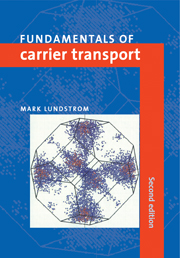Book contents
- Frontmatter
- Contents
- Preface to the second edition
- Preface to the first edition
- An overview
- 1 The quantum foundation
- 2 Carrier scattering
- 3 The Boltzmann transport equation
- 4 Low-field transport
- 5 Balance equations
- 6 Monte Carlo simulation
- 7 High-field transport in bulk semiconductors
- 8 Carrier transport in devices
- 9 Transport in mesoscopic structures
- Appendix 1 Summary of indicial notation and tensors
- Appendix 2 Some useful integrals
- Index
6 - Monte Carlo simulation
Published online by Cambridge University Press: 30 March 2010
- Frontmatter
- Contents
- Preface to the second edition
- Preface to the first edition
- An overview
- 1 The quantum foundation
- 2 Carrier scattering
- 3 The Boltzmann transport equation
- 4 Low-field transport
- 5 Balance equations
- 6 Monte Carlo simulation
- 7 High-field transport in bulk semiconductors
- 8 Carrier transport in devices
- 9 Transport in mesoscopic structures
- Appendix 1 Summary of indicial notation and tensors
- Appendix 2 Some useful integrals
- Index
Summary
In Chapter 3 we introduced the Boltzmann Transport Equation (BTE) as an alternative to calculating the position and momentum versus time for each carrier within a device. The BTE is usually very difficult to solve; it is much easier to simulate the trajectories of individual carriers as they move through a device under the influence of electric fields and random scattering forces. Since each path is determined by choosing random numbers (properly distributed to reflect the probabilities of the various scattering events) the technique is a game of chance which has become known as Monte Carlo simulation. If the number of simulated trajectories is large enough, the average results are a good approximation to the average behavior of the carriers within a real device. In many cases, Monte Carlo simulation is the most accurate technique available for simulating transport in devices; it is frequently the standard against which the validity of simpler approaches is gauged.
Much of our understanding of high-field transport in bulk semiconductors and in devices has been obtained through Monte Carlo simulation, so it is important to understand the basics of the method. Because it directly mimics the physics, an understanding of the technique is also useful for the insight it affords. This chapter's emphasis is on the underlying principles of the Monte Carlo technique and on how the results of a Monte Carlo simulation are interpreted.
- Type
- Chapter
- Information
- Fundamentals of Carrier Transport , pp. 247 - 281Publisher: Cambridge University PressPrint publication year: 2000
- 1
- Cited by



